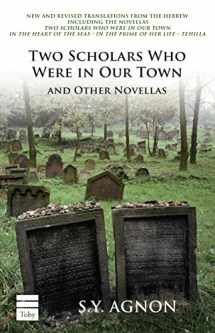
Two Scholars Who Were in Our Town and Other Novellas
Book details
Summary
Description
New and Revised Translations from the Hebrew Including the Novellas Two Scholars Who Were in Our Town · In the Heart of the Seas · In the Prime of Her Life · Tehilla. The volume's title story Two Scholars Who Were in Our Town tells of the epic clash between two Torah scholars who according to the Talmudic phrase cannot abide each other in matters of halakhah . First published in Hebrew 1956, the story is set over a period of roughly thirty years during the mid-nineteenth century in an unnamed Our Town, clearly meant to be Agnon's native Buczacz (in today's western Ukraine). Narrating from a point three or four generations after the action, the narrator waxes nostalgic even elegiac for a time when Torah was beloved by Israel and the entire glory of a man was Torah, [when] our town was privileged to be counted among the most notable towns in the land on account of its scholars. And yet, as the plot unwinds and insults are traded in the Study House, the ancient Talmudic curse begins to work its dark power, leading to the tragic denouement. And here we see Agnon's power as a tragedian on an almost Greek scale. With his typical irony at work, the narrator pines for an earlier, more ideal time which turns out to have been rife with flaws and tragic personalities of its own. This draws the reader to question was it always ever thus? This is Agnon at his best distilling the classical texts of Jewish study into a modern midrashic matrix on which he composed his Nobel-winning literature. Includes new Foreword by Jeffery Saks and a bibliographic essay reviewing the literary criticism.


We would LOVE it if you could help us and other readers by reviewing the book
Book review



